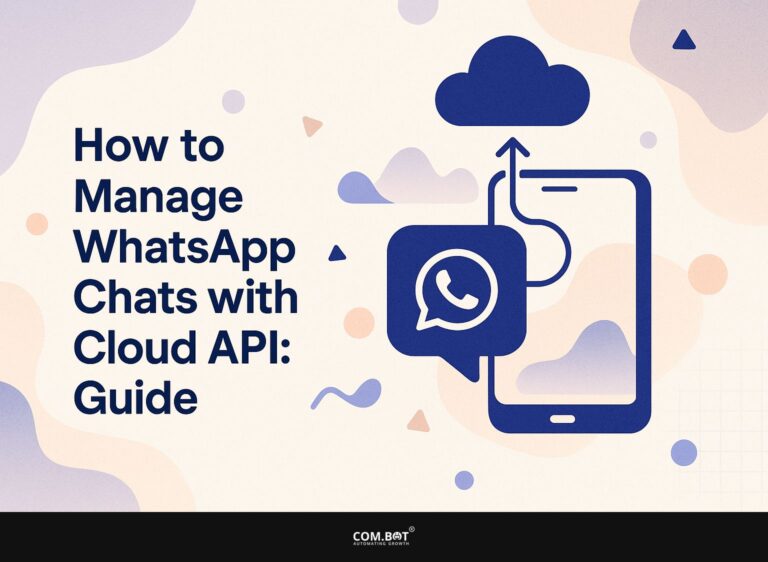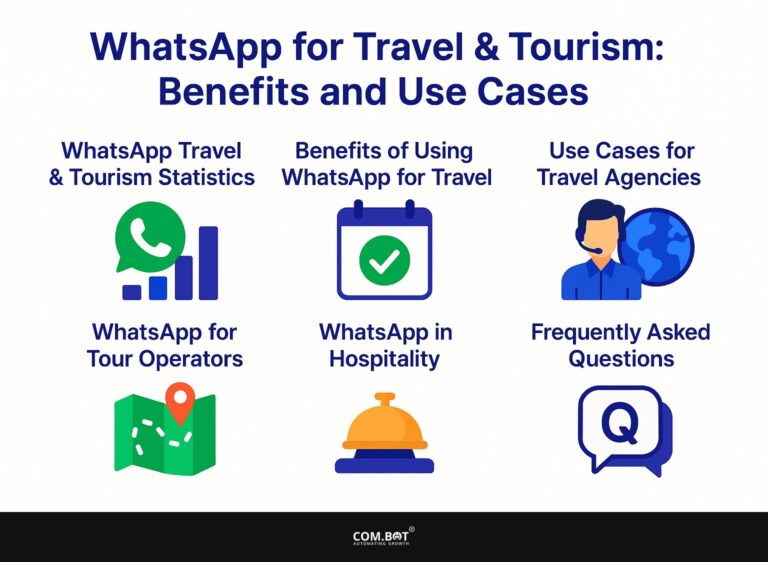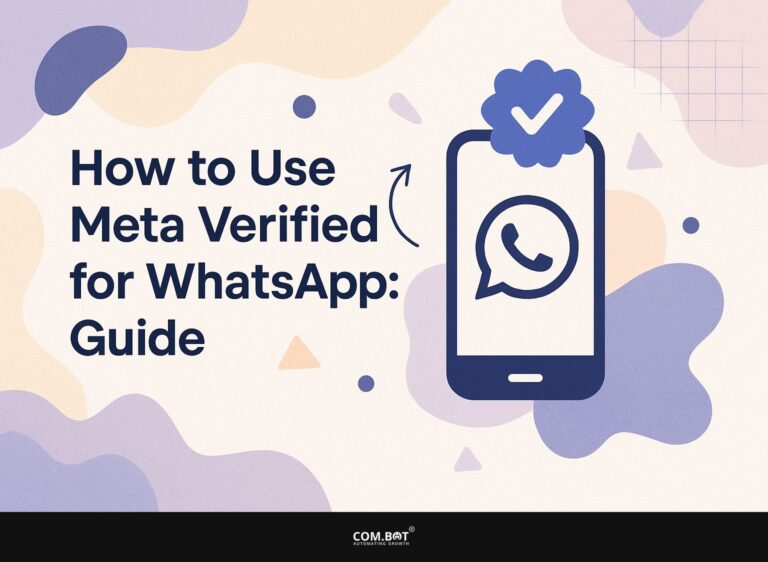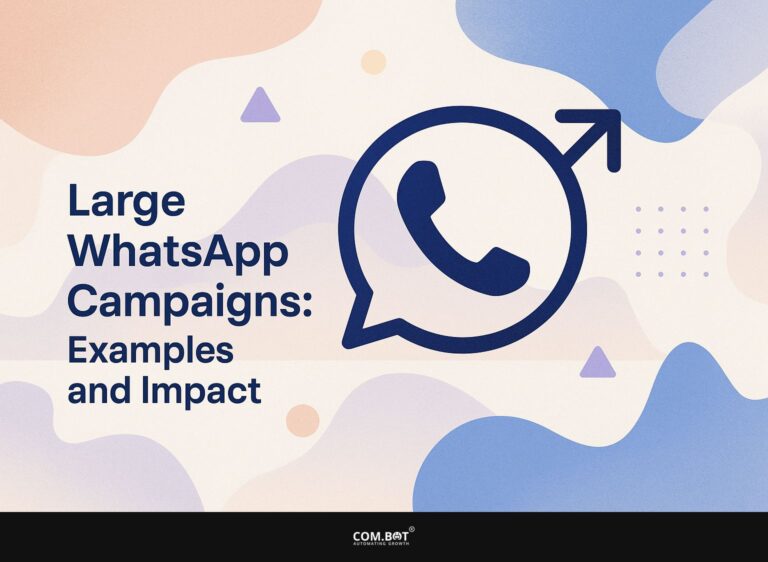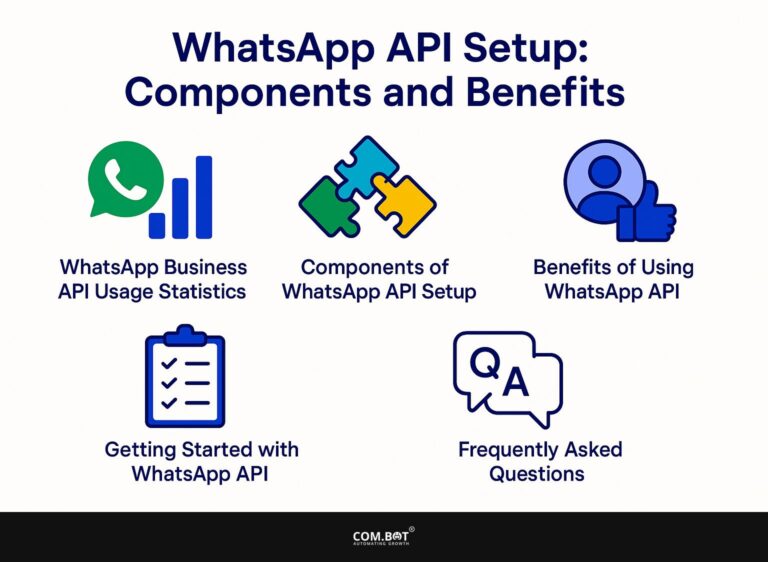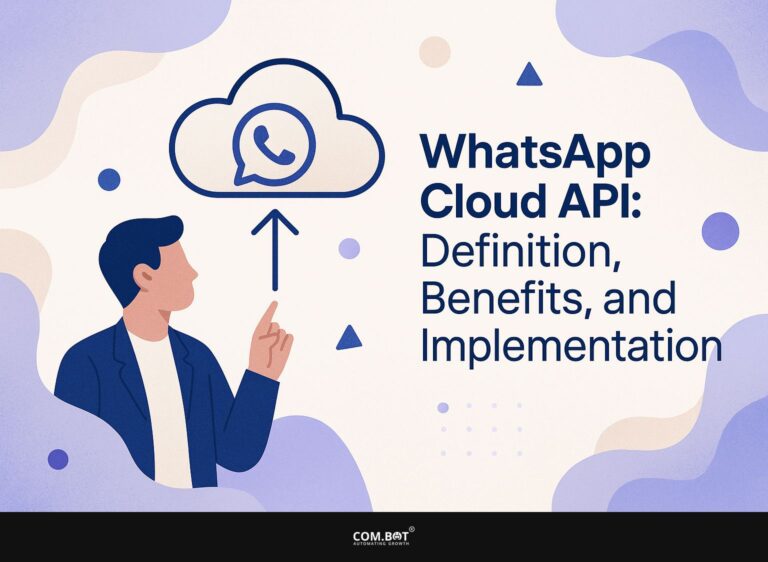WhatsApp API: Security, Privacy, and Compliance
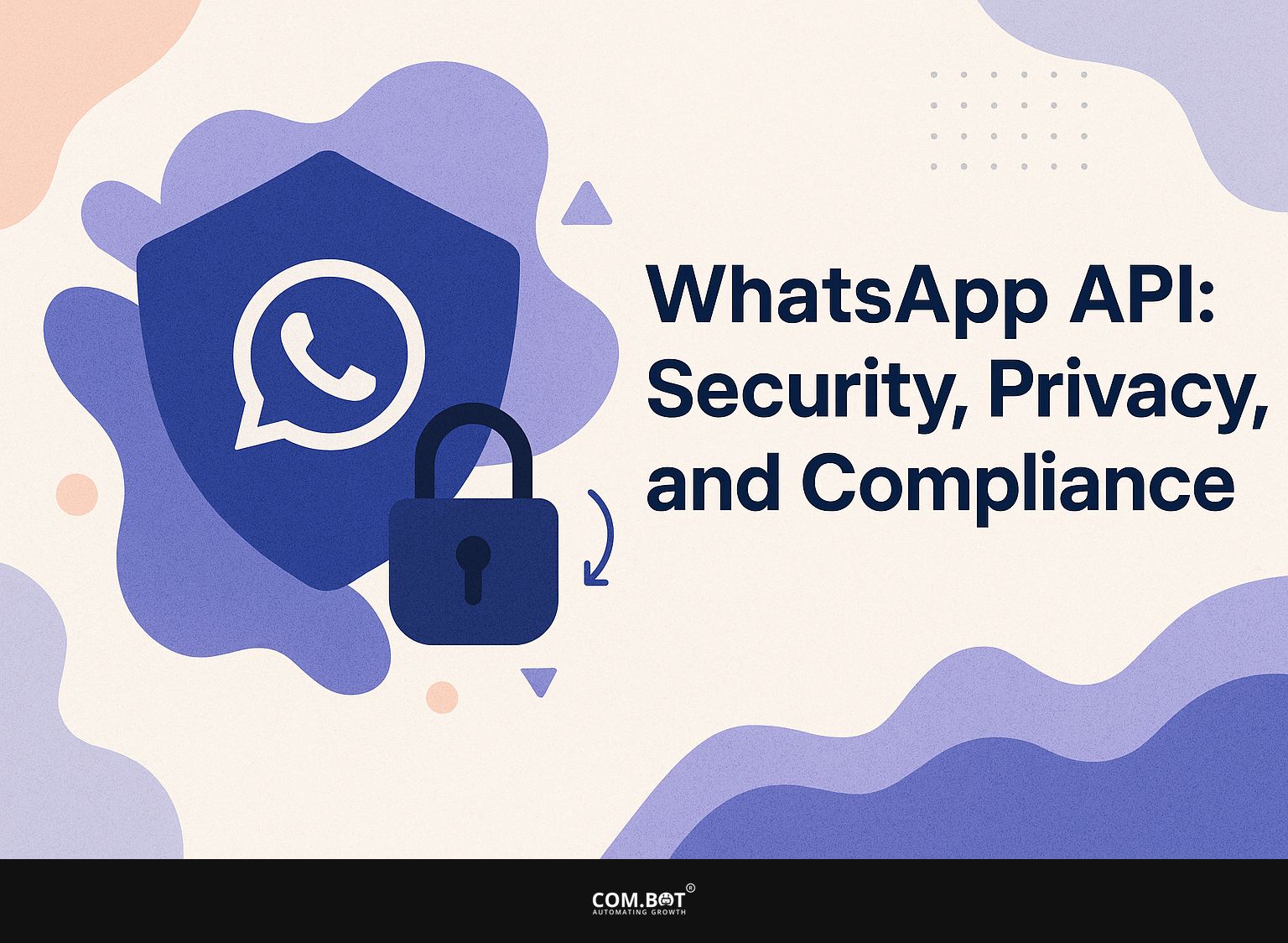
Making sure customer service works well with the WhatsApp Business API needs strong attention to security, privacy, and compliance. With strict data privacy laws like GDPR and CCPA affecting business operations, it’s important to know the strong features of the API. This article will discuss how the WhatsApp Business API helps with quick communication while following legal rules, allowing your organization to build trust and provide great customer experiences.
Key Takeaways:
- WhatsApp API prioritizes security and privacy to protect user data.
- Using end-to-end encryption and data protection methods keeps messaging safe.
- Compliance with GDPR, CCPA, and other regulations is essential for privacy and data protection.
- 1 WhatsApp Security and Business API Overview 2025
- 2 WhatsApp Security and Business API Overview 2025
- 3 Security Features of WhatsApp API
- 4 Privacy Considerations
- 5 Compliance with Regulations
- 6 Best Practices for Implementation
- 7 Frequently Asked Questions
- 7.1 1. What is the WhatsApp API and how does it relate to security, privacy, and compliance?
- 7.2 2. Is the WhatsApp API secure for businesses to use?
- 7.3 3. How does the WhatsApp API protect user privacy?
- 7.4 4. Is the WhatsApp API compliant with data privacy laws?
- 7.5 5. How does the WhatsApp API keep businesses compliant with messaging regulations?
- 7.6 6. Can businesses trust the WhatsApp API with their customer data?
Overview of WhatsApp Business API
WhatsApp Business API provides companies with an effective tool to connect with customers, enabling the use of pre-set replies and live messaging. With features like automatic messaging, businesses can create quick replies to common questions, greatly speeding up response times.
For example, online stores can send order confirmations and shipping updates automatically, improving how customers feel about their service. User engagement metrics are another notable feature; companies can track message opens, response rates, and customer feedback.
Industries like hospitality use these measurements to improve their services. Successful implementations include major retailers utilizing the API to manage customer queries during peak seasons, demonstrating its versatility across industries.
WhatsApp Security and Business API Overview 2025
WhatsApp Security and Business API Overview 2025
Vulnerability Results: Serious and Major Issues
API Usage and Effectiveness: WhatsApp Business API Usage
The WhatsApp Security and Business API Overview 2025 gives details about security weaknesses and the widespread use of WhatsApp’s Business API by companies around the world. It’s important to tackle security worries and make the most of what APIs can offer to increase involvement and keep users trusting business communications.
Vulnerability Findings reveal that WhatsApp identified 1 critical vulnerability and 4 high-severity vulnerabilities. Even though these numbers are low, regular security checks are important for safeguarding user data and maintaining trust. Quickly finding and fixing these weaknesses is important to stop data leaks and keep communication channels safe.
API Usage and Effectiveness shows a strong image of WhatsApp’s role in business communication. Notably, 150 million users engage monthly with businesses via WhatsApp, highlighting the platform’s significant role in customer service and marketing. Furthermore, 200 million businesses on Instagram use WhatsApp, indicating a synergistic relationship between these platforms for enhancing customer engagement and streamlining communication.
- Marketing Dynamics: The data shows 53.7% of US marketers use Instagram Reels for marketing, showing the move towards changing content to grab audience interest. Additionally, 54% of influencers are categorized as nano-influencers, highlighting the increasing value of tailoring influence for specific market segments.
- Security Concerns: Notably, 64% of users remain uncertain about chat app security, highlighting a critical area for improvement in communication and transparency about security measures.
- Market Penetration: Instagram accounts are widely used for business marketing, with 86% in the US, 81% in the UK, and 75% of Germany-based online stores using the platform to advertise products.
The overview captures both the potential and challenges within WhatsApp’s ecosystem. Handling security issues while effectively using the Business API can increase trust and interaction, creating a strong setting for business communication today.
Importance of Security and Privacy
Security and privacy are critical in using the WhatsApp Business API, as they directly affect customer trust and compliance with data protection regulations.
Businesses using the WhatsApp API should focus on end-to-end encryption to protect customer messages. This encryption makes sure that messages can only be seen by the sender and recipient, reducing the risk of data leaks.
Following rules like GDPR safeguards user data and builds trust. According to recent studies, over 70% of users express concerns about their data privacy on messaging platforms. By clearly explaining data usage rules and safely handling customer details, companies can build trust and get more users involved.
Security Features of WhatsApp API
WhatsApp Business API uses strong security measures, including end-to-end encryption, to keep user data safe from unauthorized access (for more on GDPR compliance and security measures, see our WhatsApp Business: GDPR Compliance and Security for SMEs guide).
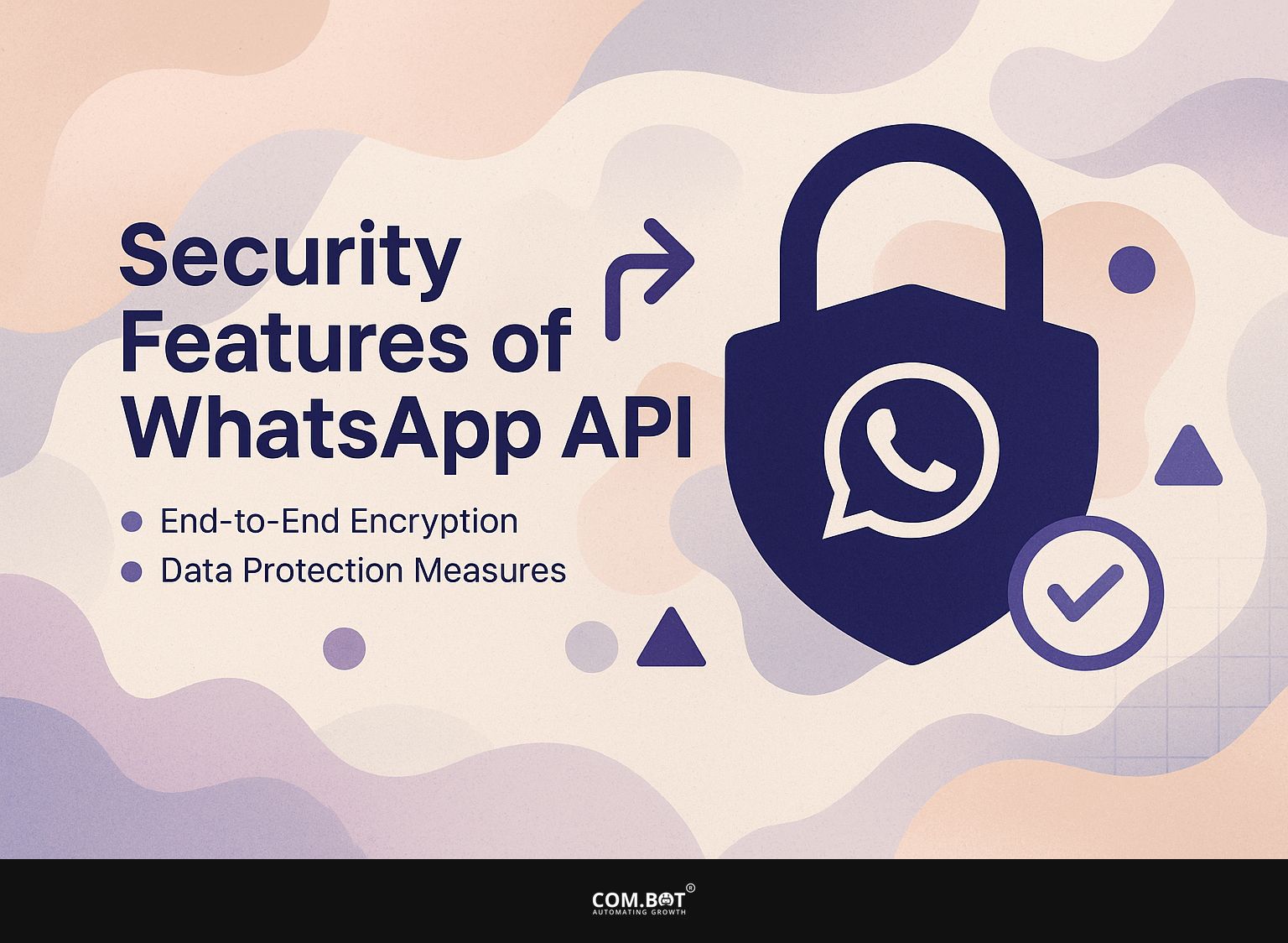
1. End-to-End Encryption
End-to-end encryption makes sure that messages are only accessible to the sender and the receiver, protecting private conversations with customers.
With the WhatsApp Business API, all messages are coded on the sender’s phone and decoded on the receiver’s phone. This process makes sure that even WhatsApp cannot read the content. Businesses can confidently handle sensitive customer data, such as payment details or personal information, knowing their interactions are secure.
Using this encryption safeguards privacy and helps create trust with customers, which is important for keeping relationships over time. To do it well, companies should use the newest API version and apply strict rules for data access.
2. Data Protection Measures
WhatsApp Business API uses strict data protection methods to meet international and regional legal requirements. To increase security, it uses data minimization methods, so only the needed data is collected.
Secure authentication methods, such as OAuth 2.0, protect user access, while end-to-end encryption safeguards message content. Regular compliance audits assess adherence to standards like GDPR, allowing businesses to maintain transparency.
Tools like Data Protection Impact Assessments (DPIA) help identify and mitigate risks, while access controls limit data exposure, further enhancing security. By integrating these strategies, businesses can effectively safeguard sensitive information and uphold user trust.
Privacy Considerations
Businesses using the WhatsApp Business API should concentrate on privacy issues, particularly getting user consent and handling data correctly. Additionally, understanding the nuances of GDPR compliance and security can greatly enhance data management practices. Our in-depth look at WhatsApp Business GDPR compliance and security provides valuable insights for businesses aiming to meet privacy standards effectively.
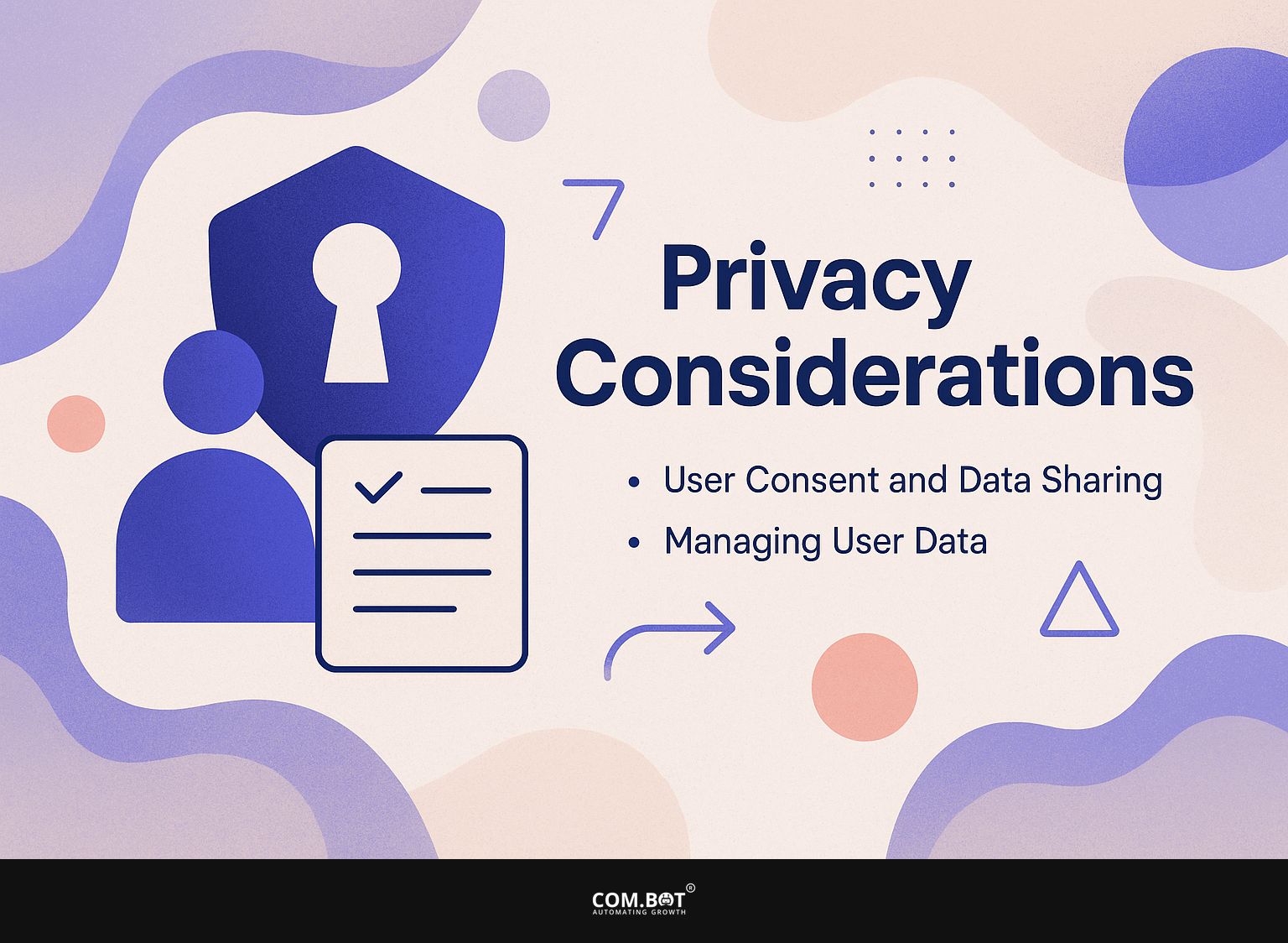
1. User Consent and Data Sharing
Getting user permission for data sharing is essential when using the WhatsApp Business API to meet legal standards and build trust.
To secure user consent, businesses should implement clear opt-in forms that explicitly state what data will be collected and how it will be used. This can be effectively achieved using tools like Typeform or Google Forms.
For instance, a simple consent message could say: ‘Clicking here means you agree to provide your contact details for updates and offers.’
Informing users about your messaging rules on a regular basis improves openness and strengthens trust. Always provide an easy opt-out option to respect user preferences.
2. Managing User Data
Properly handling user data is important, requiring compliance with data storage rules and safe storage methods.
To manage user data correctly, use encrypted databases with tools like MySQL or MongoDB that have built-in encryption options. Check data every three months to make sure it follows rules and find any possible dangers.
Use cloud storage services like AWS S3 or Google Cloud Storage for safe off-site data storage, guaranteeing backup copies and easy access. Employ compliance tracking software like OneTrust or TrustArc to monitor adherence to regulations like GDPR, helping keep user data handling transparent and lawful.
Compliance with Regulations
Following regulations like GDPR and CCPA is necessary for companies using the WhatsApp Business API to prevent serious legal consequences. For businesses looking to ensure their compliance, understanding the nuances of these regulations is crucial. Learn more about how WhatsApp Business handles GDPR compliance and security measures to better inform your strategy.
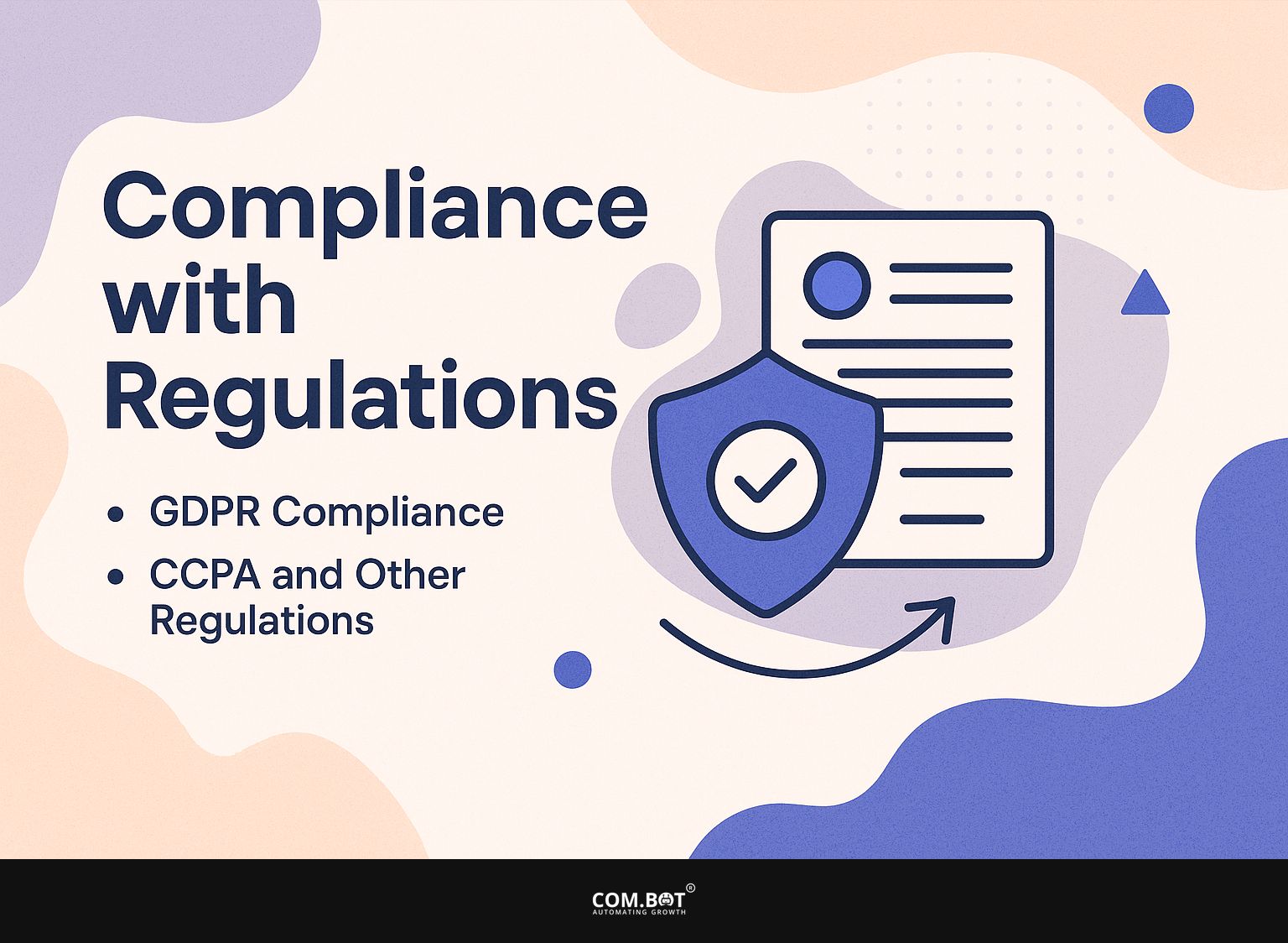
1. GDPR Compliance
GDPR compliance is essential for businesses operating in Europe, requiring explicit user consent for data processing.
To comply with the WhatsApp Business API, begin by getting clear permission from users. This can be achieved through an explicit opt-in checkbox during account registration or service sign-up. Next, carry out a data protection impact assessment (DPIA) to assess risks and describe actions to reduce possible privacy violations.
Appoint a Data Protection Officer (DPO) to oversee compliance efforts, ensuring that your data processing activities align with GDPR guidelines. These steps will help maintain transparency and build trust with your client base.
2. CCPA and Other Regulations
The California Consumer Privacy Act (CCPA) mandates clear guidelines for businesses on data collection and user consent, impacting those using the WhatsApp Business API.
Meeting CCPA rules requires companies to put in place some important steps.
- Update privacy notices to clearly inform users about what data is collected and how it is used.
- Establish procedures to enable users to exercise their rights, such as the right to access and delete their personal data.
- To improve compliance, consider tools like OneTrust for tracking user consent and handling data requests.
This proactive approach meets legal requirements and builds customer trust, following GDPR standards.
Best Practices for Implementation
Following best practices in security and privacy can greatly improve how the WhatsApp Business API works and help meet legal standards. For comprehensive insights into these best practices, especially around handling media messages securely, consider exploring our guide on sending media messages and best practices.
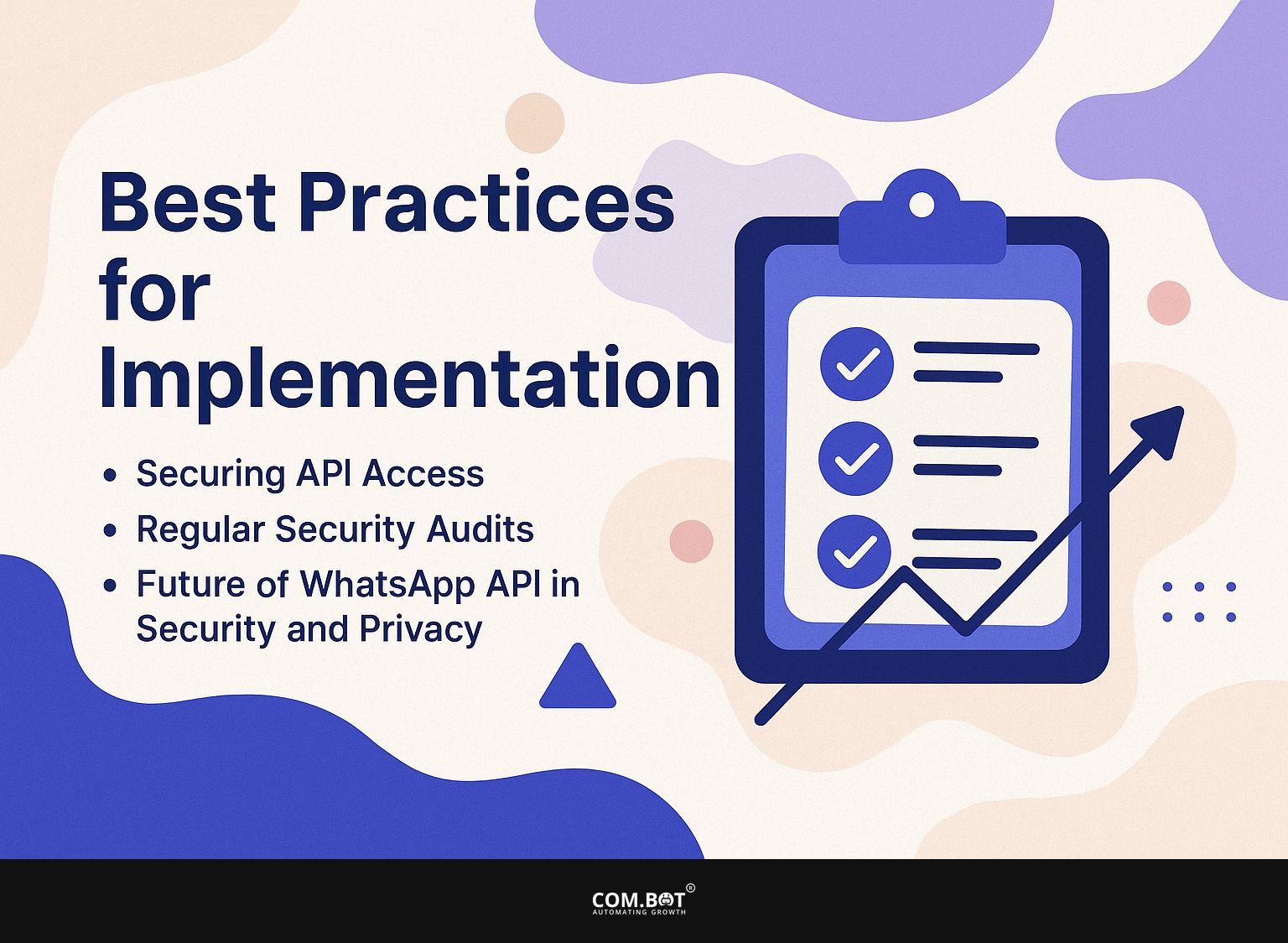
1. Securing API Access
Securing API access is paramount, requiring methods like two-factor authentication to prevent unauthorized access.
Start by enabling two-factor authentication (2FA) using tools like Authy or Google Authenticator, which generate time-based codes for login verification. Next, implement IP whitelisting to restrict access to known IP addresses; this can usually be configured in your API settings.
Always use secure connections (HTTPS) to encrypt data transit. Regularly review your API key permissions and revoke any that are unnecessary. By using these strategies, you make your API much safer and make sure that only people with permission can use your systems.
2. Regular Security Audits
Regular security checks are important to identify weaknesses and comply with data protection regulations. For effective security checks, perform them quarterly or semi-annually at a minimum.
Start with a checklist that includes items like:
- System configurations
- Data handling practices
- Access controls
Use tools like Nessus to scan for security gaps in your network, or Qualys for managing security through the cloud. A case study from a mid-sized company shows that after implementing regular audits, they reduced security incidents by 40% within a year, significantly lowering their risk profile and enhancing customer trust.
3. Security and Privacy in WhatsApp API Going Forward
The development of the WhatsApp Business API will probably focus on improving security measures and clearer data management to reduce risks.
To stay ahead of compliance requirements, businesses should implement end-to-end encryption and regularly update their privacy policies. Using strong tools for handling data, such as OneTrust or TrustArc, can make following rules easier.
Collecting feedback from users with surveys or focus groups helps learn what customers need and the problems they face, helping with future updates.
Regularly checking the API documentation helps you stay informed about new features or policy updates, which builds trust and security with users.
Frequently Asked Questions
1. What is the WhatsApp API and how does it relate to security, privacy, and compliance?
The WhatsApp API is a set of tools and resources that allow businesses to connect with their customers through WhatsApp messaging. The API keeps messages secure by encrypting them, keeps user data private, and obeys all necessary rules and laws.
2. Is the WhatsApp API secure for businesses to use?
Yes, the WhatsApp API is built with security in mind and uses end-to-end encryption to protect all messages sent through the platform. This means that only the sender and recipient can see the content of the messages, ensuring that they are kept confidential.
3. How does the WhatsApp API protect user privacy?
The WhatsApp API is designed to protect user privacy by only allowing businesses to communicate with users who have opted to receive messages from them. This means that businesses cannot send unsolicited messages and users have control over who can contact them through WhatsApp.
4. Is the WhatsApp API compliant with data privacy laws?
Yes, the WhatsApp API follows all relevant data privacy laws, including the General Data Protection Regulation (GDPR) in the European Union and the California Consumer Privacy Act (CCPA) in the United States. This makes sure that user information is gathered, saved, and used following legal and ethical guidelines.
5. How does the WhatsApp API keep businesses compliant with messaging regulations?
The WhatsApp API has built-in features to help businesses stay compliant with messaging regulations, such as allowing users to opt out of receiving messages, providing templates for common types of business messages, and monitoring for spam and abuse.
6. Can businesses trust the WhatsApp API with their customer data?
Yes, the WhatsApp API has a strong track record of securely handling customer data and has implemented strict protocols and measures to prevent data breaches and unauthorized access. Businesses can manage the data they gather and choose to erase it whenever they want.
